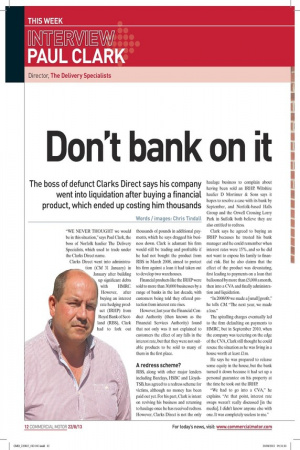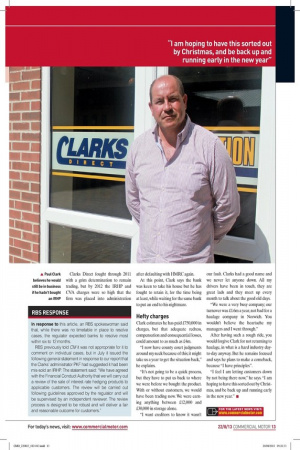on't bank on it
Page 8

Page 9

If you've noticed an error in this article please click here to report it so we can fix it.
The boss of defunct Clarks Direct says his company went into liquidation after buying a financial product, which ended up costing him thousands Words / images: Chris Tindall
"WE NEVER THOUGHT we would be in this situation," says Paul Clark, the boss of Norfolk haulier The Delivery Specialists, which used to trade under the Clarks Direct name. Clarks Direct went into administration (CM 31 January) in January after building up significant debts with HMRC. However, after buying an interest rate hedging product (IRHP) from Royal Bank of Scotland (RBS), Clark had to fork out Clarks Direct went into administration (CM 31 January) in January after building up significant debts with HMRC. However, after buying an interest rate hedging product (IRHP) from Royal Bank of Scotland (RBS), Clark had to fork out Clarks Direct went into administration (CM 31 January) in January after building up significant debts with HMRC. However, after buying an interest rate hedging product (IRHP) from Royal Bank of Scotland (RBS), Clark had to fork out Clarks Direct went into administration (CM 31 January) in January after building up significant debts with HMRC. However, after buying an interest rate hedging product (IRHP) from Royal Bank of Scotland (RBS), Clark had to fork out Clarks Direct went into administration (CM 31 January) in January after building up significant debts with HMRC. However, after buying an interest rate hedging product (IRHP) from Royal Bank of Scotland (RBS), Clark had to fork out Clarks Direct went into administration (CM 31 January) in January after building up significant debts with HMRC. However, after buying an interest rate hedging product (IRHP) from Royal Bank of Scotland (RBS), Clark had to fork out
thousands of pounds in additional payments, which he says dragged his business down. Clark is adamant his firm would still be trading and profitable if he had not bought the product from RBS in March 2008, aimed to protect his firm against a loan it had taken out to develop two warehouses.
Financial products like the IRHP were sold to more than 30,000 businesses by a range of banks in the last decade, with customers being told they offered protection from interest rate rises.
However, last year the Financial Conduct Authority (then known as the Financial Services Authority) found that not only was it not explained to customers the effect of any falls in the interest rate, but that they were not suitable products to be sold to many of them in the first place.
A redress scheme?
RBS, along with other major lenders including Barclays, HSBC and LloydsTSB, has agreed to a redress scheme for victims, although no money has been paid out yet. For his part, Clark is intent on reviving his business and returning to haulage once he has received redress. However, Clarks Direct is not the only
haulage business to complain about having been sold an IRHP. Wiltshire haulier D Mortimer & Sons says it hopes to resolve a case with its bank by September, and Norfolk-based Halls Group and the Orwell Crossing Lorry Park in Suffolk both believe they are also entitled to redress.
Clark says he agreed to buying an IRHP becauses he trusted his bank manager and he could remember when interest rates were 15%, and so he did not want to expose his family to financial risk. But he also claims that the effect of the product was devastating, first leading to payments on a loan that ballooned by more than £5,000 a month, then into a CVA and finally administration and liquidation.
"In 2008/09 we made a [small] profit," he tells CM "The next year, we made a loss."
The spiralling charges eventually led to the firm defaulting on payments to HMRC, but in September 2010, when the company was teetering on the edge of the CVA, Clark still thought he could rescue the situation as he was living in a house worth at least £1m.
He says he was prepared to release some equity in the house, but the bank turned it down because it had set up a personal guarantee on his property at the time he took out the IRHP.
"We had to go into a CVA," he explains. "At that point, interest rate swaps weren't really discussed [in the media]. I didn't know anyone else with one. It was completely useless to me." Clarks Direct fought through 2011 with a grim determination to remain trading, but by 2012 the IRHP and CVA charges were so high that the firm was placed into administration
after defaulting with HMRC again.
At this point, Clark says the bank was keen to take his house but he has fought to retain it, for the time being at least, while waiting for the same bank to put an end to his nightmare.
Hefty charges
Clark estimates he has paid £750,000 in charges, but that adequate redress, compensation and consequential losses, could amount to as much as £4m.
"I now have county court judgments around my neck because of this; it might take us a year to get the situation back," he explains.
"It's not going to be a quick process, but they have to put us back to where we were before we bought the product. With or without customers, we would have been trading now. We were earning anything between £12,000 and £30,000 in storage alone. "I want creditors to know it wasn't
our fault. Clarks had a good name and we never let anyone down. All my drivers have been in touch, they are great lads and they meet up every month to talk about the good old days.
"We were a very busy company; our turnover was £1.6m a year, not bad for a haulage company in Norwich. You wouldn't believe the heartache my managers and I went through."
After having such a rough ride, you would forgive Clark for not returning to haulage, in what is a hard industry dayto-day anyway. But he remains focused and says he plans to make a comeback, because "I have principles". "I feel I am letting customers down by not being there now," he says. "I am hoping to have this sorted out by Christmas, and be back up and running early in the new year." •









































